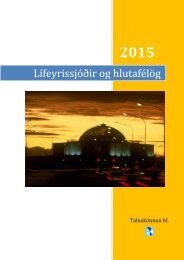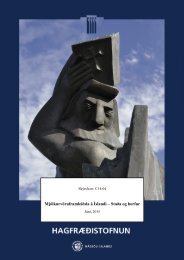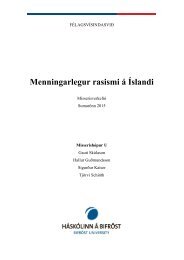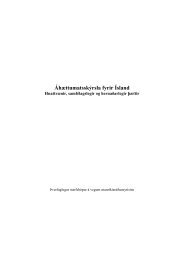Create successful ePaper yourself
Turn your PDF publications into a flip-book with our unique Google optimized e-Paper software.
WORLD REPORT 2016<br />
HUMAN RIGHTS WATCH<br />
In spite of abuses, Canada has not introduced regulations to provide incentives<br />
or require international apparel brands domiciled in Canada to make non-financial,<br />
human rights-related disclosures, such as the names of their suppliers and<br />
subcontractors, to facilitate labor rights compliance throughout the supply<br />
chain.<br />
Asylum Seekers’ and Migrants’ Rights<br />
In 2012, parliament passed Bill C-31, which permits the government to designate<br />
a group of incoming migrants as “irregular arrivals,” subjecting them to mandatory<br />
detention with limited judicial review and risking the prolonged detention of<br />
refugees and children 16 and older. Bill C-31 created a Refugee Appeal Division,<br />
but asylum seekers from 27 “designated countries” that have a history of respecting<br />
human rights are not allowed to appeal their denials, although the Federal<br />
Court may review their denials. C-31 also places a five-year ban on “irregular<br />
arrivals” from applying for permanent residence, which impinges upon the right<br />
of separated refugee families to reunite.<br />
In July, the Federal Court held that denying applicants from “designated countries”<br />
the right to appeal a rejected claim violates equality rights under Canada’s<br />
Charter of Rights and Freedoms. Three people had challenged the constitutionality<br />
of the policy: a gay man from Croatia and gay partners from Hungary, who all<br />
feared persecution based in part on their sexual orientation. The government is<br />
appealing the decision.<br />
Also in 2012, Canada modified the Interim Federal Health Program to limit access<br />
to essential healthcare services to many asylum seekers, a decision that a<br />
Canadian court subsequently declared a form of “cruel and unusual treatment,”<br />
and thus unconstitutional. In response, the federal government introduced a<br />
temporary health program providing partial health care coverage for some<br />
refugees.<br />
In 2015, the UN Human Rights Committee urged Canada to refrain from detaining<br />
“irregular migrants” for indefinite periods, to ensure that detention is used as a<br />
measure of last resort, and to provide refugee claimants from “designated countries”<br />
with access to an appeal. The committee further recommended that<br />
Canada reinstate essential healthcare services to all refugee claimants, irrespective<br />
of their status.<br />
Central African Republic<br />
A transitional government led by interim President Catherine Samba-Panza<br />
struggled to establish security in the Central African Republic. The Bangui National<br />
Forum, held in May, set the country on a path toward elections, but there<br />
was little progress on reconciliation, disarmament, and the reassertion of state<br />
control.<br />
Although the capital, Bangui, was relatively calm for the first half of the year, renewed<br />
sectarian violence gripped the city in late September. In 2015, at least<br />
100 people died, of which at least 45 were civilians, shot at point blank range or<br />
stabbed to death or had their throats slit. Over 400 people were injured.<br />
Sectarian violence and attacks on civilians were widespread in central regions of<br />
the country, most notably in Ouaka province, where predominantly Muslim Seleka<br />
rebels and largely Christian and animist anti-balaka militias continued to<br />
fight each other. By the end of 2015, thousands had been killed on both sides<br />
and hundreds of villages burned. An estimated 456,000 people, the majority<br />
Muslim, remained refugees. A further 447,000 remained displaced internally.<br />
The United Nations peacekeeping mission, MINUSCA, deployed across many<br />
parts of the country, after taking over from African Union (AU) peacekeepers in<br />
2014. They worked alongside French peacekeepers, known as Sangaris, to attempt<br />
to protect civilians and re-establish order. Their efforts were hampered by<br />
accusations that international peacekeepers were involved in sexual abuse of<br />
civilians, including children. Special representative of the secretary-general,<br />
Babacar Gaye, who led MINUSCA, resigned over the scandal.<br />
Impunity remained a serious challenge, although there was new hope with steps<br />
taken toward the establishment of a Special Criminal Court in the national justice<br />
system. The International Criminal Court (ICC) prosecutor continued investigations<br />
started in September 2014.<br />
Attacks on Civilians<br />
The Seleka (“alliance” in Sango, the country’s principal language), a predominantly<br />
Muslim rebellion made up of loosely affiliated factions, fractured into several<br />
different groups after infighting over political agendas and resources. The<br />
162<br />
163










